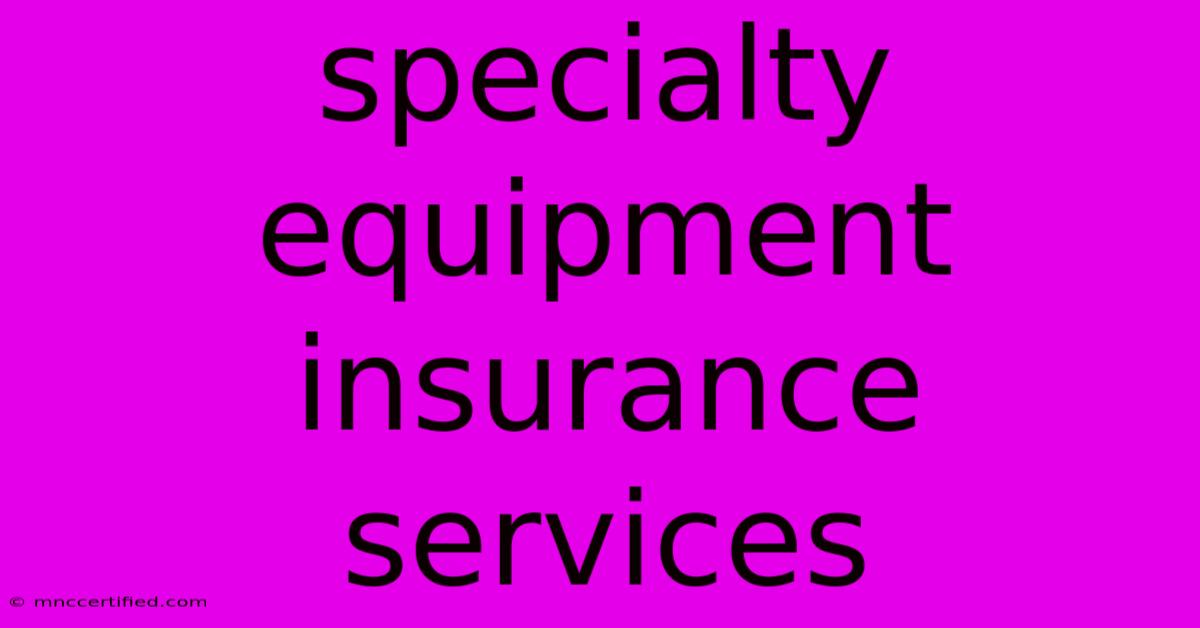Specialty Equipment Insurance Services

Table of Contents
Protect Your Investment: Understanding Specialty Equipment Insurance Services
Owning specialized equipment is an investment, and protecting it is crucial for your business's success. Whether you're a construction company relying on heavy machinery, a film production company with expensive cameras, or a tech startup with cutting-edge equipment, understanding the nuances of specialty equipment insurance is essential. This comprehensive guide will explore the importance of specialized coverage, different types of policies, and key factors to consider when choosing the right insurance.
Why Is Specialty Equipment Insurance Necessary?
Standard business property insurance often doesn't provide adequate coverage for unique, high-value equipment. Here's why specialty equipment insurance is vital:
- Higher Value: Specialized equipment is often expensive and irreplaceable. General insurance policies may have limitations on coverage amounts for specific items.
- Unique Risks: Different types of equipment face unique risks. For example, construction machinery may be prone to accidents, while film equipment is vulnerable to damage during transportation.
- Business Interruption: Equipment failure or damage can significantly disrupt your business operations. Specialty insurance can provide coverage for lost income and expenses incurred during downtime.
Types of Specialty Equipment Insurance
Here are some common types of insurance tailored for specific equipment:
- Construction Equipment Insurance: Covers excavators, cranes, bulldozers, and other heavy machinery used in construction projects. This policy often includes coverage for damage, theft, accidents, and liability.
- Film & Video Equipment Insurance: Protects cameras, lenses, lighting equipment, sound systems, and other essential items used in film production. It typically covers damage, theft, and loss during filming, transportation, and storage.
- Medical Equipment Insurance: Covers specialized equipment used in healthcare settings, such as MRI machines, X-ray equipment, and surgical tools. It can provide coverage for damage, malfunction, and liability related to the equipment's use.
- Technology Equipment Insurance: Designed for tech companies, this insurance protects computers, servers, software, and other IT equipment against damage, theft, and data loss.
Key Considerations for Choosing the Right Policy
When selecting specialty equipment insurance, consider these factors:
- Value of Equipment: Determine the fair market value of your equipment to ensure adequate coverage.
- Risk Factors: Assess potential risks specific to your industry and equipment type.
- Coverage Limits: Understand the coverage limits for different events, such as accidents, theft, and natural disasters.
- Deductibles: Determine the deductible amount you're comfortable paying in case of a claim.
- Insurance Premiums: Compare quotes from different insurers to find competitive pricing.
Benefits of Specialty Equipment Insurance
- Financial Protection: Ensures financial security in case of damage, theft, or loss of your equipment.
- Business Continuity: Helps you recover from equipment-related incidents and minimize downtime.
- Peace of Mind: Provides reassurance that your valuable assets are protected.
Finding the Right Insurance Provider
- Consult with an Insurance Broker: An experienced broker can help you understand different policies and find the best coverage for your needs.
- Compare Quotes: Get quotes from multiple insurers to compare coverage and pricing.
- Read Policy Documents: Carefully review the policy terms and conditions before signing.
Conclusion
Investing in specialty equipment insurance is an essential step in protecting your business. By understanding the different types of policies and key considerations, you can choose the right coverage to safeguard your valuable assets and ensure your business's continued success. Don't gamble with your investment; secure adequate insurance to protect your equipment and your future.

Thank you for visiting our website wich cover about Specialty Equipment Insurance Services. We hope the information provided has been useful to you. Feel free to contact us if you have any questions or need further assistance. See you next time and dont miss to bookmark.
Featured Posts
-
Trump Putin Talks Possible Ukraine Demands Unclear
Nov 09, 2024
-
2024 Nba Suns Vs Mavericks Nov 8th Result
Nov 09, 2024
-
Father Son Nba Dreams Delayed Bronny To G League
Nov 09, 2024
-
Senior American Life Insurance Company
Nov 09, 2024
-
2025 Grammy Awards Full Nominee List
Nov 09, 2024